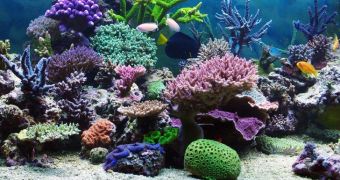It looks like it may be time to say goodbye to coral reefs, fish and whatever other creatures are now swimming our planet's seas and oceans. A new report pieced together by an international team of scientists says that, under a business-as-usual scenario, ocean acidification is likely to increase by as much as 170% by the end of this century.
For those unaware, ocean acidification is the result of CO2's (the same CO2 human society releases into the atmosphere) creeping into whatever bodies of water it can find and changing their pH.
So yes, we are the ones to blame if, by the year 2100, our seas and oceans become about twice as acidic as they used to be.
Specialists warn that, all things considered, the phenomenon will not affect just marine biodiversity, although it is very much true that ocean dwellers will be the ones hit the hardest.
On the contrary, global food supplies will also hit a fairly rough patch, Science News says.
Otherwise put, fish sticks and oysters could become quite difficult to come by. They might even become contraband.
In light of these findings, specialists urge world leaders to curb atmospheric CO2 pollution.

 14 DAY TRIAL //
14 DAY TRIAL //